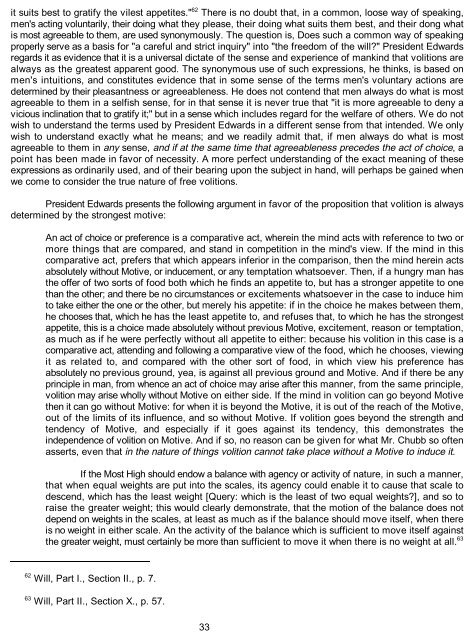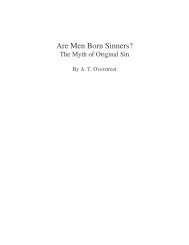Foreknowledge by Joel Hayes - Library of Theology
Foreknowledge by Joel Hayes - Library of Theology
Foreknowledge by Joel Hayes - Library of Theology
You also want an ePaper? Increase the reach of your titles
YUMPU automatically turns print PDFs into web optimized ePapers that Google loves.
62<br />
it suits best to gratify the vilest appetites." There is no doubt that, in a common, loose way <strong>of</strong> speaking,<br />
men's acting voluntarily, their doing what they please, their doing what suits them best, and their dong what<br />
is most agreeable to them, are used synonymously. The question is, Does such a common way <strong>of</strong> speaking<br />
properly serve as a basis for "a careful and strict inquiry" into "the freedom <strong>of</strong> the will?" President Edwards<br />
regards it as evidence that it is a universal dictate <strong>of</strong> the sense and experience <strong>of</strong> mankind that volitions are<br />
always as the greatest apparent good. The synonymous use <strong>of</strong> such expressions, he thinks, is based on<br />
men's intuitions, and constitutes evidence that in some sense <strong>of</strong> the terms men's voluntary actions are<br />
determined <strong>by</strong> their pleasantness or agreeableness. He does not contend that men always do what is most<br />
agreeable to them in a selfish sense, for in that sense it is never true that "it is more agreeable to deny a<br />
vicious inclination that to gratify it;" but in a sense which includes regard for the welfare <strong>of</strong> others. We do not<br />
wish to understand the terms used <strong>by</strong> President Edwards in a different sense from that intended. We only<br />
wish to understand exactly what he means; and we readily admit that, if men always do what is most<br />
agreeable to them in any sense, and if at the same time that agreeableness precedes the act <strong>of</strong> choice, a<br />
point has been made in favor <strong>of</strong> necessity. A more perfect understanding <strong>of</strong> the exact meaning <strong>of</strong> these<br />
expressions as ordinarily used, and <strong>of</strong> their bearing upon the subject in hand, will perhaps be gained when<br />
we come to consider the true nature <strong>of</strong> free volitions.<br />
President Edwards presents the following argument in favor <strong>of</strong> the proposition that volition is always<br />
determined <strong>by</strong> the strongest motive:<br />
62<br />
Will, Part I., Section II., p. 7.<br />
63<br />
An act <strong>of</strong> choice or preference is a comparative act, wherein the mind acts with reference to two or<br />
more things that are compared, and stand in competition in the mind's view. If the mind in this<br />
comparative act, prefers that which appears inferior in the comparison, then the mind herein acts<br />
absolutely without Motive, or inducement, or any temptation whatsoever. Then, if a hungry man has<br />
the <strong>of</strong>fer <strong>of</strong> two sorts <strong>of</strong> food both which he finds an appetite to, but has a stronger appetite to one<br />
than the other; and there be no circumstances or excitements whatsoever in the case to induce him<br />
to take either the one or the other, but merely his appetite: if in the choice he makes between them,<br />
he chooses that, which he has the least appetite to, and refuses that, to which he has the strongest<br />
appetite, this is a choice made absolutely without previous Motive, excitement, reason or temptation,<br />
as much as if he were perfectly without all appetite to either: because his volition in this case is a<br />
comparative act, attending and following a comparative view <strong>of</strong> the food, which he chooses, viewing<br />
it as related to, and compared with the other sort <strong>of</strong> food, in which view his preference has<br />
absolutely no previous ground, yea, is against all previous ground and Motive. And if there be any<br />
principle in man, from whence an act <strong>of</strong> choice may arise after this manner, from the same principle,<br />
volition may arise wholly without Motive on either side. If the mind in volition can go beyond Motive<br />
then it can go without Motive: for when it is beyond the Motive, it is out <strong>of</strong> the reach <strong>of</strong> the Motive,<br />
out <strong>of</strong> the limits <strong>of</strong> its influence, and so without Motive. If volition goes beyond the strength and<br />
tendency <strong>of</strong> Motive, and especially if it goes against its tendency, this demonstrates the<br />
independence <strong>of</strong> volition on Motive. And if so, no reason can be given for what Mr. Chubb so <strong>of</strong>ten<br />
asserts, even that in the nature <strong>of</strong> things volition cannot take place without a Motive to induce it.<br />
If the Most High should endow a balance with agency or activity <strong>of</strong> nature, in such a manner,<br />
that when equal weights are put into the scales, its agency could enable it to cause that scale to<br />
descend, which has the least weight [Query: which is the least <strong>of</strong> two equal weights?], and so to<br />
raise the greater weight; this would clearly demonstrate, that the motion <strong>of</strong> the balance does not<br />
depend on weights in the scales, at least as much as if the balance should move itself, when there<br />
is no weight in either scale. An the activity <strong>of</strong> the balance which is sufficient to move itself against<br />
the greater weight, must certainly be more than sufficient to move it when there is no weight at all. 63<br />
Will, Part II., Section X., p. 57.<br />
33






